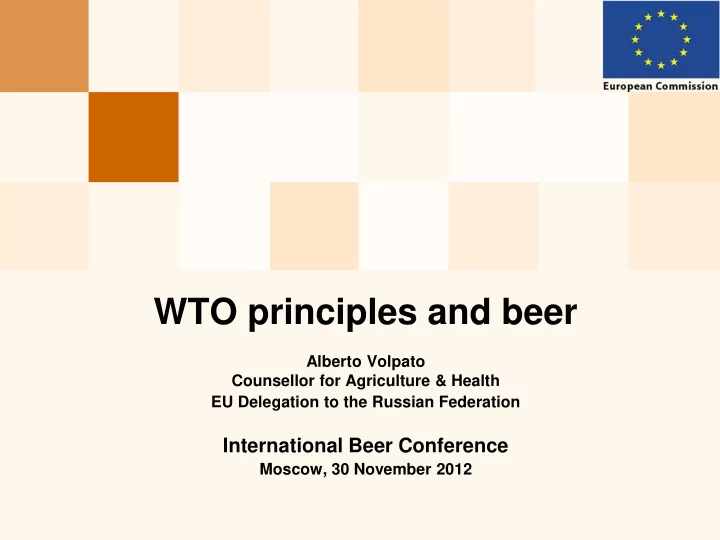

WTO principles and beer Alberto Volpato Counsellor for Agriculture & Health EU Delegation to the Russian Federation International Beer Conference Moscow, 30 November 2012
Main issues Accession of the Russian Federation to WTO Some relevant WTO principles/norms (market access commitments for goods, MFN, NT, TBT, SPS, Agreement on Import Licensing Procedures, DS, etc..) 2
Import duties for beer RF import duty for beer (HS 2203): In bottles/other Initial : 0.6 euro per 1L Final : 0.018 euro per 1L Implementation period : 2018 In containers holding more than 10 liters Initial : 0.6 euro per 1L Final : 0.04 euro per 1L Implementation period : 2017 EU import duty for beer (HS 2203): Free 3
TBT Agreement The Agreement on Technical Barriers to Trade aims to ensure that regulations, standards, testing and certification procedures do not create unnecessary obstacles to trade, while also providing members with the right to implement measures to achieve legitimate policy objectives, such as the protection of human health and safety, or the environment Labelling and packaging requirements 4
TBT Agreement Beer definition in Russian Federation Federal Law №171 (as amended by Federal Law № 218) as of 1 January 2013, ―beer‖ vs. ―beer - based drinks‖ : sets the limit of the weight content of corn products and (or) sugar-containing products of 20% of the malt. Plus the weight of the sugar-containing products is limited to 2% of the weight of the replaceable brewer’s malt. As a result : - Restrictions appear contradictory to the world brewing practice - Many international beer brands of the highest quality will be called in Russia ―beer - based drinks‖, which would appear a hidden form of non -tariff barriers and discrimination 5
TBT Agreement The EU has requested the urgent suspension of the application from 1.1.2013 of the requirement of 80% malt content in beer according to beer definition in SRL. The EU has also requested the suppression of excessive limitation of sugar content, in the beer definition in both SRL and published draft TR. Sugar is usually not added (except when it is part of the beer recipe) but usually results from the fermentation process.
TBT Agreement Beer definition in the draft of the Technical Regulation on Safety of Alcohol products in the Customs Union Allows ratio 50/50 of malted/non malted materials However, still limits the weight of the sugar-containing products to 2% of the weight of malt, grains and grain adjuncts The EU and other WTO members have requested notification to WTO of the draft CU Technical Regulation under Art. 2.9 TBT. The Russian Federation has replied it will notify. 7
SPS Agreement Sanitary or phytosanitary measures — Any measure applied i.a. to protect human or animal life or health within the territory of the Member from risks arising from additives, contaminants, toxins or disease-causing organisms in foods, beverages or feedstuffs Art. 3.1 : harmonisation with international standards (Codex Alimentarius for food safety) 8
SPS Agreement Codex Alimentarius GSFA (General Standard on Food Additives) Food Category: Beer and malt beverages 14.2.1 ― Alcoholic beverages brewed from germinated barley (malt), hops, yeast, and water ‖ - Maximum acceptable levels of certain food additives or group - List of food additives which may be used in this food category under the conditions of good manufacturing practice (GMP)
SPS Agreement The EU has requested the suppression of the prohibition, in the beer definition in both SRL and published draft TR, of the addition of flavouring additives. This practice, which is allowed under Codex Alimentarius as well as in EU law, is usually used in niche beers with special flavours. The EU has also requested that the ban on the use of polyethylene terephthalate (PET) for packaging of alcohol products for human consumption, especially beer, foreseen in the draft TR, will not be adopted, since such component is not harmful for human health, environmentally sound and widely used.
National Treatment on internal taxation and regulation No discrimination between domestic and imported products in relation to internal taxes, charges, regulation and these should not be applied so as to afford protection to domestic production. RF confirmed the differentiation of excise tax rates applied to specific categories of alcoholic beverages (beer, wine and spirits) was based on the principle of harmonizing the applied rate of taxation with the concentration of pure alcohol in those beverages and RF would not apply any system of excise taxation to imported alcoholic products that would be discriminatory. 11
Agreement on Import Licensing Procedures Automatic import licensing procedures to be administered not to have restricting effects on imports RF will eliminate non-automatic import licensing requirement for alcoholic beverages upon WTO accession, to be replaced by an automatic licensing procedure – ethyl alcohol, wines and alcoholic beverages exceeding 28% volume 12
Dispute Settlement EU vs. Canada ―Tax exemptions and reductions for wines and beer‖, 2006 The legislation eliminated or reduced excise duties on Canadian wine made from 100 per cent Canadian-grown agricultural products and on domestic beer, while leaving the excise tax on imported wine and beer intact. Mutually agreed solution in 2008 based on the reduction, on a most- favoured nation basis, of applied customs duties on certain products imported in Canada 13
Dialogues Dialogue between regulatory authorities Dialogue between regulatory authorities and stakeholders, in particular the brewing industry 14
Спасибо! 15
Recommend
More recommend